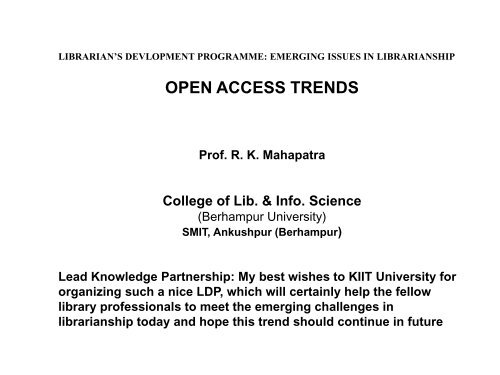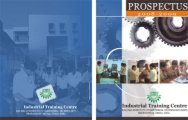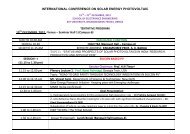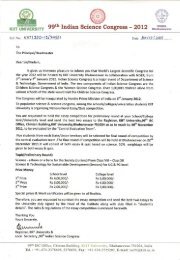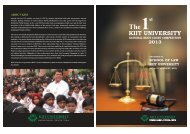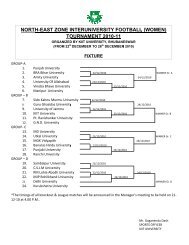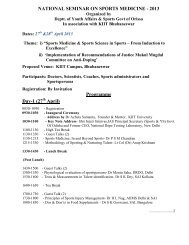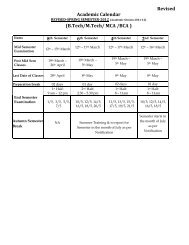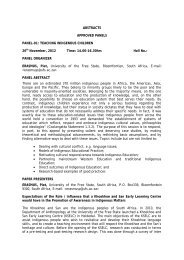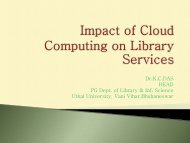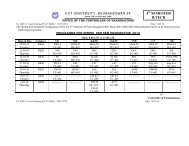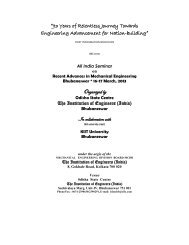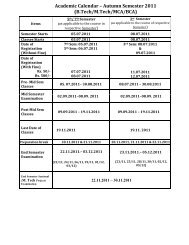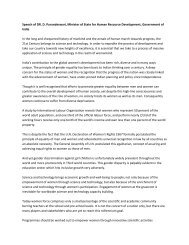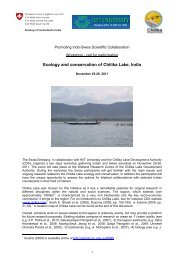download - KIIT University
download - KIIT University
download - KIIT University
You also want an ePaper? Increase the reach of your titles
YUMPU automatically turns print PDFs into web optimized ePapers that Google loves.
LIBRARIAN’S DEVLOPMENT PROGRAMME: EMERGING ISSUES IN LIBRARIANSHIP<br />
OPEN ACCESS TRENDS<br />
Prof. R. K. Mahapatra<br />
College of Lib. & Info. Science<br />
(Berhampur <strong>University</strong>)<br />
SMIT, Ankushpur (Berhampur)<br />
Lead Knowledge Partnership: My best wishes to <strong>KIIT</strong> <strong>University</strong> for<br />
organizing such a nice LDP, which will certainly help the fellow<br />
library professionals to meet the emerging challenges in<br />
librarianship today and hope this trend should continue in future
Introduction<br />
Open-access mandates have almost doubled globally that has<br />
elapsed since Harvard’s mandate in May 2008’, Steven Harnard,<br />
<strong>University</strong> of Southhampton, U.K. (Nature, 2009).<br />
New trend the first International Open Access Week, 2009 at The<br />
National Library of Sweden called Open Access, ‘promote maximum<br />
accessibility and visibility of works produced by researchers, teachers and<br />
students’.<br />
Open Access Forum 2011: UNESCO<br />
UNESCO Open Access strategy approved by the UNESCO Executive<br />
Board 187th & 36th session of the General Conference. The invited experts from<br />
all over the world discussed how to create a network collaborative platform to<br />
promote Open Access to scientific information and research<br />
India: An” announcement made by CSIR, urging the<br />
establishment of institutional repositories in each of its more than<br />
laboratories & conversion of all their journals to open access.” (Chan, et<br />
al, 2009).<br />
The above demonstrates a current worldwide interest in and<br />
willingness to embrace open access.
Problems<br />
‣ Rising costs of subscriptions<br />
‣ Permission barriers imposed by publishers<br />
‣ Barred access to the extent to research and care<br />
‣ Lack of information<br />
‣ Lack awareness<br />
‣ Lack of interest and willingness to do<br />
The now-annual event has been expanded from a single day to<br />
accommodate widespread global interest in the movement toward open, public<br />
access to scholarly research results.” (OpenAccessWeek.org, 2009).<br />
Information scientist Mikael Laakso, Hanken School of Economics, Helsinki,<br />
his colleagues, found the number of fully open-access journals growing at<br />
around 15% every year as new journals are founded and subscription journals<br />
switch to the open-access model<br />
The open-access publishing model has proven itself to work<br />
Laakso divides the history of open access into three phases. First the<br />
pioneering years of 1993–99, most open-access journals "home-brew" efforts,<br />
by individuals and hosted on university servers. Next the innovation years, the<br />
birth of publishers the Public Library of Science and software infrastructure that<br />
makes it much easier to launch a digital journal<br />
cont…
Since 2005, Laakso says, innovation has slowed but growth continues<br />
— the consolidation phase. Following this trend, last week Nature Publishing<br />
Group (NPG) launched Scientific Reports , an author-pays, open-access, onlineonly<br />
journal, which reviews papers on technical soundness rather than impact.<br />
Needs<br />
To resolving the deep knowledge gap lies in creating a global<br />
knowledge base & essential research emanating from both research<br />
communities in developing countries as well as from ‘international’ research.<br />
To develop a better understanding of the common characteristics of OA<br />
scholarly publishing and citation network<br />
Significance/OPPORTUNITY<br />
‣ Empowering authors with content creation using Tools that are not constrained<br />
by the paper metaphor so that, no matter what happens on the publisher's side<br />
of the transaction, authors can use and re-use their work as flexibly as possible.<br />
‣ The technology now exists for authors to transcend the limitations of paper<br />
formatting (Sefton, 2009),<br />
‣ Strengthening research capacity in developing countries is one of the most<br />
effective and sustainable ways of advancing, development and helping correct<br />
the gap in research (Chan, et al, 2009)
OPEN ACCESS<br />
Free to access, Free to reuse, Creative Commons license, OPEN<br />
ACCESS = Free Access + Re-use<br />
Definition of OA<br />
No subscription or license required to access the electronic edition of the<br />
journal Licensing agreement that allows free use and re-use (<strong>download</strong>ing,<br />
sharing, printing copies, use of tables and figures, possibility for text-mining, etc.)<br />
at least for non-commercial/scholarly purposes.<br />
Changing metaphors Knowledge as ”paper” Knowledge as ”product” and<br />
”property” Created by scientists Owned by publishers Archived by libraries --<br />
John Wilbanks, Science Commons, IATUL, 2007<br />
New Metaphors Knowledge = NETWORK Knowledge = infrastructure ”A<br />
better reflection of the reality of knowledge” -- John Wilbanks, Science<br />
Commons, IATUL, 2007<br />
A social network diagram, Screenshot taken by Darwin Peacock, accessed<br />
through Wikimedia<br />
Open Access (OA) is the provision of free access to peer-reviewed,<br />
scholarly and research information to all. It requires that rights holders grant<br />
worldwide irrevocable right to copy, use, distribute, transmit and make derivative<br />
works in any format for any lawful activities with proper attribution to the original<br />
author. (Unesco, 2011)<br />
OA is about freedom, flexibility and fairness
Advantages: Ex. On-line journals<br />
‣No problem of space<br />
‣A constraint for print journals<br />
‣Unlimited use of colour images, figures, tables<br />
‣No need for limits on references (word counts)<br />
‣Access to original data<br />
‣Multimedia (Audio/podcasts and Video)<br />
‣Hyperlinking and Text mining<br />
‣Plagiarism<br />
‣Online publication - easier to plagarize and be detected<br />
‣Software programs to detect plagarism<br />
‣Free and priced<br />
‣Crossref Crosscheck<br />
‣Theft of ideas is unethical<br />
‣Debate over reuse of content for results and methods<br />
‣Self-plagiarism<br />
‣Digital manipulation of images<br />
‣Ranges from enhancing the clarity of results presented to producing fraudulent data.<br />
‣Article usage<br />
‣Page views, <strong>download</strong>s<br />
‣Media and blog coverage about the article<br />
‣Social tools<br />
‣Social bookmarks e.g. Connotea, Twitter, Facebook, etc.<br />
‣Reader evaluation
Why Open Access<br />
Exploring the characteristics of formal scholarly communication on web<br />
becoming more important due to increasing numbers of authors, journals, and<br />
institutions publish and self-archive their research results online.” (Kousha,<br />
2009).<br />
OA publishers lacked a voice in public debates about scholarly<br />
communications and Open Access<br />
Open Access had become an established part of the publishing landscape, it<br />
was time to address practical issues<br />
Who are the beneficiaries<br />
To scientists, Faculty, educator, students, scholars, researchers, publishers,<br />
aggregators, public…<br />
Nations where academic, medical and non-profit research institutions have<br />
limited resources,<br />
Libraries of inadequate funds to subscribe to scientific literature,<br />
Valuable in advancing the public understanding of science, knowledge...<br />
The demand for open access publishing is growing fast and has powerful<br />
support from the scientific community. (Scientific organizations, academic<br />
institutions and public sector are publicly funded).
What way<br />
Open Access uses information and communication technology (ICT) to<br />
increase and enhance the dissemination of scholarship.<br />
Books, Journals, Reports, Conference papers, Research papers, Technical<br />
Reports, Project Reports, Theses & Dissertations, Institutional Publications,<br />
Intellectuals Properties, Databases, etc.<br />
GOOGLE, GOOGLE SCHOLAR, SCOPUS, BioMed Central<br />
Open resources<br />
Emerging Trends Related to OA/Guide to Open Access<br />
Guide to Open Access Tags:<br />
Free, open access, public, publishing, scholarly communication<br />
Open Access Books<br />
NCBI Bookshelf<br />
Internet Archive Community Books<br />
InTech Open Access Books<br />
O'Reilly Open Books<br />
Wikibooks
Connecting Open Access Repositories<br />
CORE: aims to facilitate free access to content stored across Open Access<br />
repositories, a large aggregator of content (several million publications from<br />
hundreds of Open Access repositories) value added services are provided.<br />
CORE offers five applications:<br />
CORE Portal - Allows to search and navigate scientific publications aggregated<br />
from a wide range of Open Access Repositories (OARs)<br />
CORE Mobile - An Android application that enables to search and <strong>download</strong> open<br />
access articles.<br />
CORE Plugin - A Plugin to Open Access repositories that enables to search for<br />
related scientific publications.<br />
CORE API - Enables external systems and services to interact with the CORE<br />
repository.<br />
Repository Analytics - A tool that enables to monitor the intake of metadata and<br />
content from repositories and provides a wide range of statistics.<br />
Other Open Scholarship Initiatives<br />
Open science, Open Science Grid<br />
Open data: Science Commons, Panton Principles, Dryad, BioMart<br />
Open peer review: MediaCommons - NYU Press Project<br />
Semantic Web<br />
W3C Semantic Web<br />
OpenID<br />
OpenID<br />
Cont…
Open Knowledge<br />
Open Knowledge Commons<br />
Open Knowledge Foundation<br />
Public Knowledge Project (PKP)<br />
Future possibilities<br />
International OA Week an opportunity to broaden awareness and understanding OA<br />
access policies from all types of research funders, international higher education<br />
community and the general public.<br />
Barbara Fister believes “change is in the wind” as evidenced, “100s institutions<br />
have passed open access mandates<br />
Unesco Mandate<br />
Conclusions:<br />
Barriers still exist and much more research is needed.<br />
Need to develop uniform standards and best practices<br />
Need to bring together the OA publishing community<br />
Need to share information and work collectively<br />
Creative Commons Licenses Most common http://creativecommons.org/licenses<br />
Other trends/opportunities: Experiments with peer review, Social networking Data<br />
mining, Literature mining, Sophisticated search tools, Open data, Multi-media,<br />
Open-access policy means: entire contents accessible and online
The growth rate is portrayed as dramatic, but it's not dramatic at all if the goal is<br />
100% open access," says Stevan Harnad, a cognition researcher at the <strong>University</strong> of<br />
Southampton, UK. Other ways to make papers freely accessible, such as selfarchiving<br />
and hybrid journals, which allow authors to choose whether to pay for open<br />
access, are also growing only linearly, he says. "The rate is much too low for the<br />
needs of research."<br />
Open Access Forum 2011: UNESCO<br />
UNESCO Open Access strategy approved by the UNESCO Executive Board at its<br />
187th session and further adopted by the 36th session of the General Conference.<br />
The invited experts from all over the world will also discuss how to create a network<br />
collaborative platform to promote Open Access to scientific information and research.<br />
Key global trends in Open Access to scientific information and research;<br />
Operationalizing the UNESCO Open Access strategy, including identifying partners<br />
and extrabudgetary funding sources; and<br />
Contributing ideas and new trends for future<br />
Cont..
OA the heart of UNESCO’s activities to build knowledge societies through the use<br />
of ICT. Mandated to maintain, increase and diffuse knowledge by assuring the<br />
preservation of books and knowledge resources through necessary international<br />
conventions, and by encouraging cooperation among the nations in all branches of<br />
intellectual activity through exchange of publications, objects of artistic and scientific<br />
interest and other materials of information.<br />
Developed a comprehensive strategy for OA within the framework of the<br />
Information for All Programme (IFAP) to promote universal access to information<br />
and bridge the gap between information rich and information poor. OA experts from<br />
universities, specialized non-governmental organizations, UN agencies and<br />
publishing houses together deliberated on the strategy, present the global trends in<br />
OA and identify opportunities to improve access to peer-reviewed research<br />
information to all.<br />
UNESCO OA strategy and discuss issues relevant to the promotion and<br />
development of Open Access, such as:<br />
OA strategy, policies, Curriculum for training on OA,<br />
Network and collaboration for the development of OA<br />
OA repositories and journals.<br />
The recommendations used for developing a plan of action for within the overall<br />
structure of the OA strategy.<br />
A platform for initiating dialogue and collaboration for improving access to<br />
scientific information in developing countries.
Open Books<br />
O'Reilly Open Books--books with various forms of "open" copyright over the years..<br />
Creative Commons<br />
Internet Archive,<br />
Open Library project, the Internet Archive hosting PDF open books:<br />
The Whole Internet User's Guide & Catalog<br />
Apprenticeship Patterns<br />
The Cathedral and the Bazaar<br />
CouchDB: The Definitive Guide<br />
Creating Applications with Mozilla<br />
DocBook: The Definitive Guide<br />
Embedding Perl in HTML with Mason<br />
Free as in Freedom<br />
Linux Device Drivers, 3rd Edition<br />
Managing Projects with GNU make, 3rd Edition<br />
MySQL Reference Manual<br />
OpenSources: Voices from the Open Source Revolution<br />
Producing Open Source Software: How to Run a Successful Free Software Project<br />
(Translations)<br />
Understanding Open Source and Free Software Licensing<br />
Practical mod_perl<br />
Version Control with Subversion, 2nd Edition<br />
We the Media<br />
Cont…
Out-of-Print Books<br />
Asterisk: The Future of Telephony, Second Edition<br />
CGI Programming on the World Wide Web<br />
The Future Does Not Compute<br />
Java AWT Reference<br />
Linux Device Drivers, 2nd Edition<br />
Linux Network Administrator's Guide, 2nd Edition<br />
Making TeX Work<br />
MH & xmh: Email for Users & Programmers, 3rd Edition<br />
Microsoft RPC Programming Guide<br />
OpenOffice.org XML Essentials (Unpublished)<br />
PNG: The Definitive Guide<br />
Programming the Be Operating System<br />
The Whole Internet User's Guide & Catalog<br />
Unix Text Processing (Hayden Books)<br />
Using Samba<br />
Volume 3: OPEN LOOK User's Guide (Unpublished)<br />
Volume 6A: Motif Programming Manual<br />
Volume 6B: Motif Reference Manual, 2nd Edition<br />
Volume 7A: XView Programming Manual<br />
Volume 7B: XView Reference Manual<br />
Web Client Programming with Perl<br />
Windows NT Workstation Configuration and Maintenance<br />
World Wide Web Journal<br />
Xlib Reference Manual for Version 11 of the X Window System<br />
Xlib Reference Manual for Version 11 Volume 2, 5th<br />
Contd…
X Toolkit Intrinsics Programming Manual for Version 11<br />
X Toolkit Intrinsics Reference Manual for Version 11 of the X Window<br />
System<br />
X Tool Kit Intrinsics Programming Manual for Version 11 Volume 4<br />
X Toolkit Intrinsics Programming Manual for X Version II<br />
X Toolkit Intrinsics Programming Manual: OSF/Motif 1.1 Edition for X11,<br />
Release 4<br />
X Window System Administrator's Guide for X Version 11<br />
X Window System User's Guide for X11 R3 and R4 of the X Window<br />
System<br />
X Window System User's Guide: OSF/Motif Edition<br />
Science<br />
Social sciences<br />
All subjects<br />
Languages<br />
Mathematics<br />
Miscellaneous<br />
Computing<br />
Engineering<br />
Humanities
Wikibooks:<br />
Open-content textbooks collection, anyone can edit. 2,670 books with 46,245<br />
pages, hosted by the Wikimedia Foundation, also hosts: Wikiversity Community<br />
learning<br />
The Wikimedia Foundation is a non-profit organization depends on voluntarism<br />
and donations to operate. If one find Wikibooks or other projects hosted by the<br />
Wikimedia Foundation useful, please volunteer or make a donation. Donations<br />
primarily helps to purchase server equipment, launch new projects, and develop<br />
MediaWiki—the software that makes Wikibooks possible.<br />
Wikipedia: Encyclopedia<br />
Wiktionary: Dictionary and thesaurus<br />
Wikiquote: Quotations<br />
Wikisource: Documents<br />
Wikispecies: Species directory<br />
Wikinews; News reports<br />
Wikivoyage: Travel guide<br />
Wikidata: Knowledge database<br />
Commons: Media repository<br />
Meta; Coordination<br />
Mediawiki: MediaWiki software<br />
Bugzilla: MediaWiki bug tracker<br />
Wikimedia: MediaWiki development<br />
Cont…
Community<br />
Toolbox<br />
In 80 languages including most Indian languages<br />
বাংলা, हन्द, മലയാളം, मराठ, ਪੰ ਜਾਬੀ, संस्क ृत, म සිංහ, தமிழ, ెలగ<br />
Science Commons<br />
Building on the Creative Commons model to Further Scientific Success<br />
Launched with the goal of bringing the openness and sharing made by Creative<br />
Commons licenses a success in the arts and cultural fields to the world of science.<br />
Design strategies, tools for faster, efficient Web-enabled scientific research<br />
Primary Focus:<br />
Making scientific research re-useful.<br />
Enabling “one-click” access to research tools<br />
Integrating fragmented information sources<br />
Cont…
Programs:<br />
1. Scholars Copyright Program: through Science Commons offers a spectrum<br />
of tools and resources catering to both methods of achieving OA.<br />
2. Biological Materials Transfer Project: through Science Commons develops<br />
and deploys standard, modular contracts to lower the costs of transferring<br />
physical biological materials.<br />
3. Neurocommons: through Science Commons is creating an open source<br />
knowledge management platform for neurological research.<br />
4. HealthCommons: Coalition of parties interested in changing the way basic<br />
science is translated into the understanding and improvement of human health.<br />
Corporate Structure:<br />
The other programs include:<br />
1. Creative Commons, devoted to expanding the range of creative works<br />
available for others to legally build upon and share.<br />
2. Creative Commons International (CCi), works to “port” the core Creative<br />
Commons Licenses to different copyright legislations around the world.<br />
3. ccLearn, mission to minimize barriers to sharing and reuse of educational<br />
materials.<br />
Contd…
Science Commons was housed at and received generous support from the<br />
Massachusetts Institute of Technology, where we shared space, staff and<br />
inspiration with the Computer Science and Artificial Intelligence Laboratory.<br />
Science Commons has an annual budget of approximately $750,000<br />
Operational support is raised from a variety of sources including private<br />
foundations, corporations and contracts<br />
MediaCommons<br />
A digital scholarly network<br />
The , MediaCommons and New York <strong>University</strong> Press have together been given<br />
MediaCommons Press, scholarly networks, and assesses the state of open<br />
peer review in the humanities today.
Semantic Web Health Care and Life Sciences (HCLS) Interest Group<br />
Semantic Web Health Care and Life Sciences Interest Group (HCLS IG)<br />
support the use of Semantic Web technologies across health care, life sciences,<br />
clinical research and translational medicine. These domains stand to gain<br />
tremendous benefit from intra- and inter-domain application of Semantic Web<br />
technologies as they depend on the interoperability of information from many<br />
disciplines.<br />
This includes public meeting records and access to the archives of the publicsemweb-lifesci@w3.org<br />
mailing list.<br />
Invited Experts<br />
W3C also invites some individuals to participate as Invited Experts. If you<br />
would like to apply, please verify or create your W3C web account, apply for IE<br />
status, and, if accepted, join the HCLS IG.<br />
News, Announcements<br />
Semantic Web Japan, Personalized Medicine, and Knowledge Explorer
RIKEN (The Institute of Physical and Chemical Research).<br />
RIKEN database, such as Semantic-JSON and Semantic Table. Best Practices in<br />
Personalized Medicine Workshop, Heart + Lung Research & Education FEST. new approach to<br />
medicine powerfully predictive, personalized, preventative and participatory and described<br />
progress. Many participants expressed interest in making use of network to further the cause of<br />
personalized medicine.<br />
IO Informatics.<br />
Knowledge Explorer includes the generation of SPARQL queries from user selected subnetworks<br />
without requiring knowledge of SPARQL. A full description at the W3C “Case Study:<br />
Applied Semantic Knowledgebase for Detection of Patients at Risk of Organ Failure through<br />
Immune Rejection”.<br />
C-SHALS 2011<br />
The Conference on Semantics in Health Care and Life Sciences (C-SHALS) Semantic<br />
Web Technologies in the Life Sciences. HCLS and pharma community.<br />
NCBO, PharmaIT, Pistoia, Biobanking and publishing opportunities<br />
NCBO team as well as Protégé and others in Biomedical Informatics Research Mark<br />
Musen. Healthcare and Life Sciences (CSHALS) Semantic Web Applications for the Life<br />
Sciences (SWAT4LS) is open for submissions Journal of Biomedical Semantics<br />
RDF Symposium at ACS Meeting and Data Sharing hits the papers<br />
Linking open drug data task RDF Symposium of the American Chemical Society, Boston.<br />
Linking the Resource Description Framework to Cheminformatics and Proteochemometrics”.<br />
Sharing of Data Leads to Progress on Alzheimer’s.
NCBO: National Center for Biomedical Ontologies (NCBO) NeuroInformatics Framework<br />
(NIF). provided an overview of general to specific applications of ontologies and Semantic Web<br />
Electronic Health Records. EHR’s and HCLS create a demo that employs EHR scenarios.<br />
HCLS Gatherings<br />
HCLS IG<br />
WWW 2010<br />
CSHALS Tutorial<br />
W3C’s HCLS Conference on Semantics in Healthcare and Life Sciences (CSHALS), giving<br />
background information on all of the key Semantic Web standards. Developed within pharma,<br />
healthcare, and scientific publishing, respectively.<br />
Documents<br />
Emerging practices for mapping and linking life sciences data using RDF — A case series<br />
Ontology of Rhetorical Blocks (ORB)<br />
Semantically enabling pharmacogenomic data for the realization of personalized medicine<br />
Translating standards into practice – One Semantic Web API for Gene Expression<br />
On-line Demos<br />
Clinical Observations Interoperability Demo<br />
Description of the 7tm Receptor Demo<br />
HCLS Knowledge Base: Examples<br />
Provenance of Microarray Experiments<br />
Contd…
Other<br />
Previous Charter<br />
Previous Homepage<br />
Semantic Web Activity Home<br />
Categories<br />
group logistics (23)<br />
Meta<br />
Log in<br />
Entries RSS<br />
Comments RSS<br />
WordPress.org<br />
OpenID: A safe, faster, and easier way to log in to web sites.<br />
OpenID News and Activity<br />
OpenID Foundation 2013 Community Board Member Election Results<br />
OpenID Connect: Salesforce.com works with OIDF members to transform the future of<br />
enterprise identity<br />
Registration Now Open: OIDF London Workshop: “Open Standards and Internet Identity”<br />
Benefits of OpenID<br />
Bloggers and individuals<br />
Website operators<br />
Government<br />
add OpenID to your site in free, open source library.<br />
Contd…
Who is using OpenID<br />
Google<br />
Six Apart<br />
Yahoo!<br />
Flickr<br />
MySpace<br />
Facebook<br />
Wordpress<br />
Verisign<br />
AOL<br />
Common Knowledge<br />
A network of librarians, universities, students, lawyers, and technologists working<br />
on the challenges and opportunities of building a knowledge commons.<br />
Activities are in two main areas: Digital Public Library of America and Medical<br />
Heritage Library.<br />
Medical Heritage Library<br />
Medical Heritage Library<br />
Medical Heritage Library
OPEN CONFERENCE SYSTEM: open source software for conference<br />
management and publication<br />
PKP Scholarly Publishing Conference 2013<br />
The Public Knowledge Project (PKP) and the National Autonomous <strong>University</strong> of<br />
Mexico (UNAM) International Scholarly Publishing Conference<br />
The Public Knowledge Project National Autonomous <strong>University</strong> of Mexico (UNAM)<br />
Fourth International PKP Scholarly Publishing Conference<br />
The newest Public Knowledge Project (PKP) software module, the Open<br />
Monograph Press (OMP)<br />
Open Webcast<br />
webcast<br />
A free current state of affairs for PKP, including a brief demonstration and<br />
overview of latest application in the PKP suite of open source publishing software.<br />
Webcast Live Link: http://www.ustream.tv/channel/publicknowledgeproject
omp<br />
Open Monograph Press (OMP) an open source software platform for managing the<br />
editorial workflow required to see monographs, edited volumes, and scholarly<br />
editions through internal and external review, editing, cataloguing, production, and<br />
publication.<br />
PKP's New Sponsorship Program:<br />
PKP Conference. help to ensure the ongoing progress and development of all of<br />
our software, including OJS, OCS, OHS, and OMP.<br />
Find us on Facebook<br />
community<br />
a new Facebook page post a comment and let us know what are up to, add a<br />
photo, or otherwise<br />
PKP blog<br />
Survey on the characteristics of library-based publishing programs in academic<br />
libraries<br />
Public Knowledge Project announces the 1.0 release of Open Monograph Press<br />
OJS 2.4.2 Released<br />
PKP Scholarly Publishing Conference 2013 – First confirmed speakers<br />
Aaron Swartz's Legacy
OTARIO COUNCIL OF UNIVERSITY LIBRARY<br />
The Open Knowledge Foundation<br />
‣EMPOWERING THROUGH OPEN KNOWLEDGE<br />
‣global movement to open up knowledge around the world<br />
‣bring together a diverse community,<br />
‣building a network of individuals and organisations,<br />
‣founded on key principles.<br />
‣trusted, non-partisan, pioneering and passionate.<br />
‣create change by educating, empowering, evangelising and making.<br />
School of Data teaches journalists, CSOs and others how to use data to<br />
pursue their mission.<br />
OKFestival: is the biggest open knowledge event in the world.<br />
The Public Domain Review: interesting public domain works on the web.<br />
CKAN: is the world’s leading open-source data portal platform.<br />
Open Knowledge Conference (OKCon) Open Data – Broad, Deep,<br />
Connected.<br />
A study of open-access publishing open-access journal PLoS ONE freely<br />
accessible journals. (Pub. Lib. of Sc.)<br />
Contd…
PLoS ONE<br />
(Nature Publishing Group) 2010 published 6,749 papers, world's largest<br />
journal, authors and readers like the model of a broad-based journal with light peer<br />
review.<br />
The trends "show the success of open access", says Peter Suber, director of<br />
the Open Access project Public Knowledge in Washington DC.<br />
The growth rate is portrayed as dramatic, but it's not dramatic at all if the goal<br />
is 100% open access," says Stevan Harnad, a cognition researcher at the<br />
<strong>University</strong> of Southampton, UK. Other ways to make papers freely accessible,<br />
such as self-archiving and hybrid journals, which allow authors to choose whether<br />
to pay for open access, are also growing only linearly, he says.<br />
What is not known is whether open-access journals are competing with<br />
subscription journals, or whether they have opened up a publishing niche. Harnad<br />
believes that most open-access journals are new ventures.<br />
Institutions and funders — who have led the demand for open access — must<br />
mandate grantees to deposit papers published in subscription journals in open<br />
repositories. This would free up resources to support author-pays open access.<br />
"Publishers won't convert until the money is available to pay them," he says. Cont..
Unfortunately now too many open access journals are mushrooming &<br />
publishing low standard papers just by taking money. Being freely available such<br />
publications are dangerously affecting the science.<br />
Stories by subject<br />
Lab life<br />
Policy<br />
Stories by keywords<br />
Open access<br />
Publishing<br />
PLoS<br />
Journals<br />
Digital<br />
nature jobs<br />
More science jobs<br />
Post a job for free<br />
Resources<br />
elsewhere on nature.com<br />
Scientific Reports<br />
external links<br />
Directory of Open Access Journals
Unesco<br />
Education<br />
Natural Sciences<br />
Social and Human Sciences<br />
Culture<br />
Communication and Information<br />
Media Services<br />
MEDIA SERVICES<br />
Open Access Forum 2011: UNESCO<br />
UNESCO Open Access strategy approved by the UNESCO Executive Board at its<br />
187th session and further adopted by the 36th session of the General Conference.<br />
The invited experts from all over the world will also discuss how to create a network<br />
collaborative platform to promote Open Access to scientific information and<br />
research.<br />
Key global trends in Open Access to scientific information and research;<br />
Operationalizing the UNESCO Open Access strategy, including identifying partners<br />
and extra budgetary funding sources; and<br />
Contributing ideas and new trends for future
(OA) is the provision of free access to peer-reviewed, scholarly and research information to all.<br />
It requires that rights holders grant worldwide irrevocable right to copy, use, distribute, transmit<br />
and make derivative works in any format for any lawful activities with proper attribution to the<br />
original author. Open Access uses information OA heart of UNESCO’s activities to build<br />
knowledge societies through the use of ICT.<br />
Mandated to maintain, increase and diffuse knowledge by assuring the preservation of books<br />
(ICT) to increase and enhance the dissemination of scholarship. OA is about freedom,<br />
flexibility and fairness.<br />
knowledge resources through necessary international conventions, and by encouraging<br />
cooperation among the nations in all branches of intellectual activity through exchange of<br />
publications, objects of artistic and scientific interest and other materials of information.<br />
Developed a comprehensive strategy for OA within the framework of the Information for All<br />
Programme (IFAP) to promote universal access to information and bridge the gap between<br />
information rich and information poor. OA experts from universities, specialized nongovernmental<br />
organizations, UN agencies and publishing houses will gather together to<br />
deliberate on the strategy, present the global trends in OA and identify opportunities to<br />
improve access to peer-reviewed research information to all.<br />
Strategy and discuss issues relevant to the promotion and development of Open Access:<br />
UNESCO Open Access strategy,<br />
Open Access policies,<br />
Curriculum for training on Open Access,<br />
Network and collaboration for the development of Open Access, and<br />
Open Access repositories and journals.<br />
Contd…
The recommendations of the expert meeting will be used for developing a plan<br />
of action for UNESCO within the overall structure of the Open Access strategy<br />
adopted by the General Conference. The meeting will also serve as a platform for<br />
initiating dialogue and collaboration for improving access to scientific information in<br />
developing countries.<br />
Free and Open Source Software (FOSS)<br />
Open access to scientific information<br />
Open educational resources<br />
LINKS<br />
Global Open Access Portal<br />
Files<br />
Open Access brochure<br />
Global Open Access Portal brochure<br />
Contd…
UNESCO RESOURCES<br />
Photobank, Conventions & recommendations<br />
Publications ,Statistics<br />
Priorities<br />
Africa Gender Equality, Education for All<br />
Sustainable Development, Intercultural Dialogue<br />
Knowledge Societies<br />
Popular topics<br />
World Heritage, Water<br />
Intangible Heritage, Press Freedom<br />
HIV & AIDS, Climate Change<br />
Languages, Post-Crisis<br />
Youth<br />
Resources<br />
Conventions & Recommendations<br />
Documents, Statistics<br />
Photos, Bookshop<br />
Media, Name and Logo<br />
Human rights violation
Thank you


